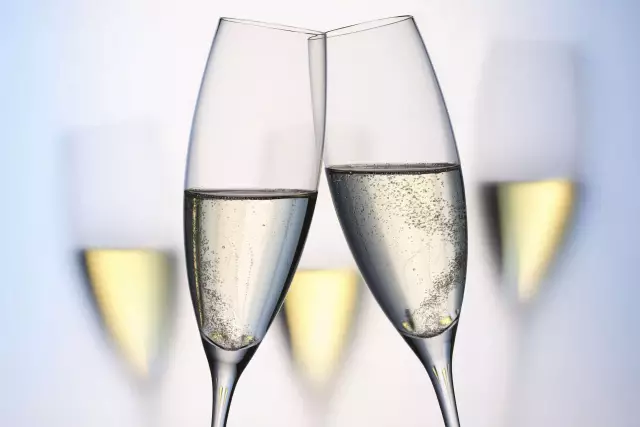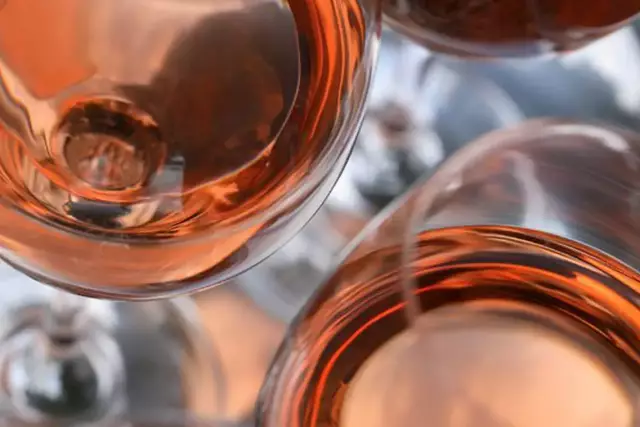Non-alcoholic wines and sparkling wines
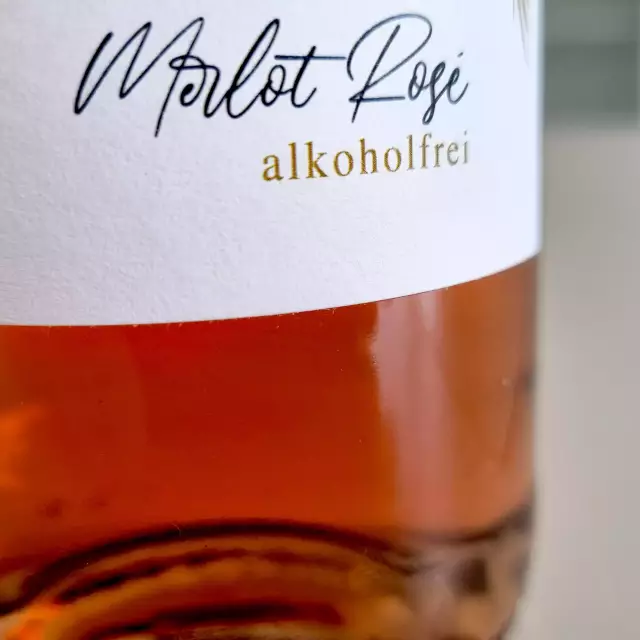
Although they are one of the smallest segments in the wine industry, the demand for dealcoholised wines is growing.
Facts
-
< 1%
Market share
-
15%
Awareness
-
< 0.5 % vol.
Alcohol
The range of dealcoholised wines and sparkling wines from wineries, winegrowers' cooperatives and commercial wineries has increased significantly in recent years. The taste of dealcoholised wines has also developed positively.
Number of producers on the riseA search for wine producers who offer alcohol-free wines, sparkling wines or secco now returns over 60 results (2022).Low level of awareness
Following the trend towards dealcoholised wines and sparkling wines, the market research institute Nielsen conducted a consumer survey on the consumption of dealcoholised wines and sparkling wines in spring 2020. 16,883 respondents from the Nielsen household panel were comparatively unaware that there is also wine without alcohol. Only 15 per cent of respondents were aware of non-alcoholic white wine, twelve per cent of the red and nine per cent of the rose-coloured alternative. Of these groups of people, around a quarter had already drunk the specified non-alcoholic type of wine. The level of awareness of non-alcoholic sparkling wines was significantly higher at 53 per cent. Almost two thirds of people who were familiar with non-alcoholic sparkling wines had already consumed them.Making alcohol-free wines
In order to produce alcohol-free wines, a wine must first be produced from which the alcohol is then removed. This is done by means of vacuum distillation.At a lower pressure, the boiling temperature of the liquid to be separated is reduced to up to 30 degrees so that the alcohol can be gently removed.
Alcohol-free wine therefore undergoes the same development stages as normal wine and still contains many of the original flavourings after alcohol reduction, but only has an alcohol content of 0.5% or less.
How do non-alcoholic wines taste?
According to the Nielsen study, some respondents stated that they were very reserved when it came to non-alcoholic wines, even though they had never consumed the products before. This may well be justified in view of the early production of alcohol-free products. Non-alcoholic wines were produced by removing the alcohol from the wine at elevated temperatures, as a result of which the wine lost a large part of its aromatic diversity. In recent years, non-alcoholic wines have developed significantly in terms of flavour thanks to the new production process. Bouquet varieties such as Sauvignon Blanc or Gewürztraminer are often used as base wines. This gives the end product an intense fruity flavour, which goes some way to compensating for the lack of alcohol. For sparkling wines, carbonic acid is used to compensate for the flavour.
Why more and more consumers are having to give up alcohol
Conscious enjoyment and a balanced lifestyle are much more important today than in the past. The fact that non-alcoholic wines often contain significantly fewer calories also plays an important role in the popularity of non-alcoholic products. So if you want to consciously avoid alcohol, alcohol-free wines and sparkling wines are a good alternative.
Good to know
According to European food law, sparkling wine, wine or beer containing a maximum of 0.5 per cent alcohol by volume (% vol.) may be declared as "alcohol-free". The amount of this percentage of so-called residual alcohol varies from drink to drink.
Podcasts: Non-alcoholic wines and sparkling wines
The DWI podcasts "Alkoholfrei" (Episode 69), Alkoholfeier Wein" (Episode 46) and "Alkoholfreier Schaumwein" (Episode 30) are available on the production of alcohol-free wine products.
What is the market share of dealcoholised sparkling wine ?
The market share of dealcoholised sparkling wine is 5%.
Varietals

with blueberries Banana and parsley waffles
with blueberries
- 25 Gramm glatte Petersilie
- 200 ml Milch
- 2 Eier Größe L
- 70 Gramm Zucker
- 1 Päckchen Vanillezucker
- 100 ml Öl
- 75 Gramm Naturjoghurt
- nach Belieben Butterschmalz oder Pfannenfett
- 300 ml Sahne
- 1 halbe Vanilleschote
- 2,5 EL Puderzucker
- 500 Gramm Blaubeeren
- 100 ml weißer Traubensaft
- 250 Gramm Mehl
- 1 TL Backpulver
- 200 Gramm überreife Bananen
- eine Prise Meersalz
Dough:
Mix the flour, 1 pinch of salt and baking powder in a bowl and set aside.
Blend the bananas and parsley with 100 ml milk to a fine puree. Put to one side.
Separate the eggs. Mix the egg yolks with 20 g sugar, vanilla sugar, oil and banana puree until smooth. Stir in the flour mixture, milk and yoghurt with a whisk.
Beat the egg whites with 1 pinch of salt and the remaining sugar until stiff. Fold the beaten egg whites into the batter.
Topping:
Whip the cream with the seeds from the vanilla pod and 1.5 tbsp icing sugar until creamy (not too stiff!). Leave to cool.
Heat a large pan, lightly caramelise 1 tbsp of icing sugar, add the blueberries and toss briefly, deglaze with the grape juice and allow to reduce briefly.
Preheat the waffle iron and melt the clarified butter. Brush the waffle iron with a little clarified butter, ladle in the batter in batches and bake until golden brown. Serve with the topping.
- Scheurebe (süß & edelsüß)
- Silvaner (süß & edelsüß)
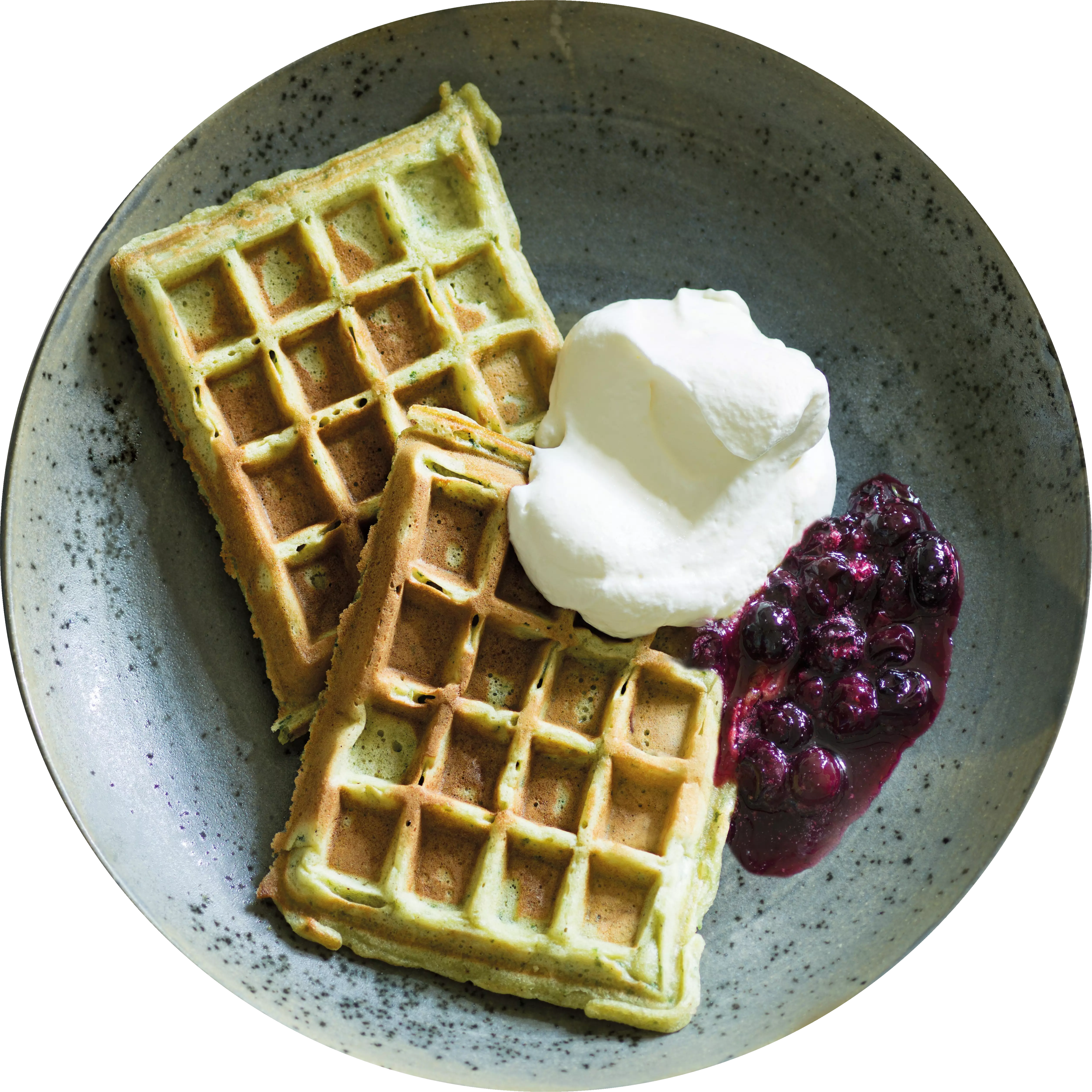
with wild mushrooms Cream of potato soup
with wild mushrooms
- 300 Gramm geschälte Kartoffeln
- 100 Gramm Wurzelgemüse
- 100 Gramm Waldpilze
- 1 ganze Zwiebel
- 1 ganze Knoblauchzehe
- 30 Gramm Speckwürfel
- 40 Gramm Margarine
- 750 ml Brühe
- 200 ml Sahne
- 1 Zweig Thymian
- nach Belieben Petersilie, Butter, Salz, Pfeffer, Muskat
Clean, wash and finely dice the root vegetables. Finely dice the onion and garlic clove and finely chop the thyme. Sauté the diced bacon with the margarine in a pan until lightly browned, add the diced onion, garlic, root vegetables and thyme. Sauté, add the stock and cook for 2 minutes.
Finely grate the potatoes, add to the soup and cook for a further 5 minutes, add the cream, season and flavour. Clean, wash and chop the mushrooms and sauté in a pan with butter. Season with salt and pepper, sprinkle with chopped parsley and pour over the soup when serving.
- Riesling (trocken)
- Riesling (halbtrocken & feinherb)
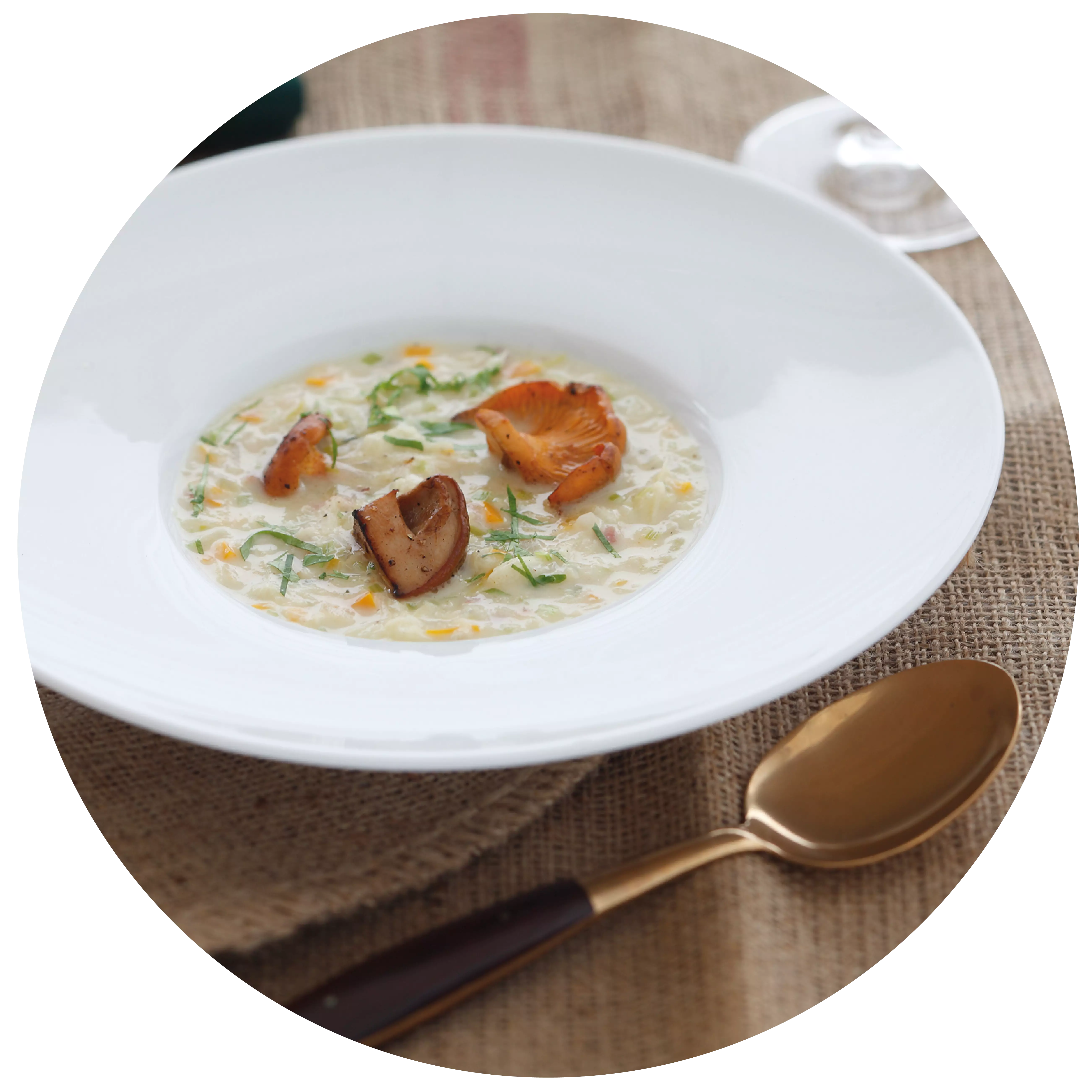
with pumpkin and white wine sauce Pasta with pumpkin and white wine sauce
with pumpkin and white wine sauce
- 750 Gramm Butternut-Kürbis(se)
- 3 kleine Zwiebeln
- 2 Zehen Knoblauch
- 1 Becher Crème fraîche
- 250 ml trockener Weißwein
- 500 ml Gemüsebrühe
- 25 Gramm Parmesan oder ähnlicher Hartkäse
- 400 Gramm Spaghetti oder andere Nudeln
- nach Geschmack Salz, Pfeffer, Zucker
- 4 EL Kürbiskerne, evtl. gehackt
- nach Belieben Muskat, Thymian
Sauté the garlic and onions until translucent. Dice the butternut squash and add, season with pepper and sugar. When the cubes are still firm, pour in the white wine and vegetable stock. Continue cooking until the squash is firm to the bite.
In the meantime, cook and drain the pasta.
Add the thyme, nutmeg, salt and crème fraîche to the boiling pumpkin, bring to the boil and thicken. Stir in the parmesan and season to taste. You can also crush some diced pumpkin to make the sauce sweeter.
Arrange the pasta on plates and top with the pumpkin sauce.
Sprinkle with pumpkin seeds.
- Scheurebe (trocken)

with fresh chanterelles Autumn bruschetta
with fresh chanterelles
- 4 Ciabatta-Brötchen
- 200 Gramm kleine Pfifferlinge
- 4 EL kleingehackte Petersilie
- 4 Zehen Knoblauch
- 80 Gramm Pecorino (Hartkäse)
- 8 EL kaltgepresstes Olivenöl
- Eine Prise Salz & Pfeffer
Preheat the oven to 200 degrees.
Clean the chanterelles. Sauté the parsley in a pan with half of the oil, then add the mushrooms and cook over a low heat for approx. 5 minutes.
Slice the rolls and bake for approx. 5 minutes until crispy.
Chop the garlic into small pieces, spread on the warm bread rolls and drizzle with the other half of the oil. Coarsely grate the pecorino.
Stir the chanterelle and parsley mixture into the pecorino and spread over the halves of the rolls.
- Pinot Gris (trocken)
- Federweißer (brut nature)
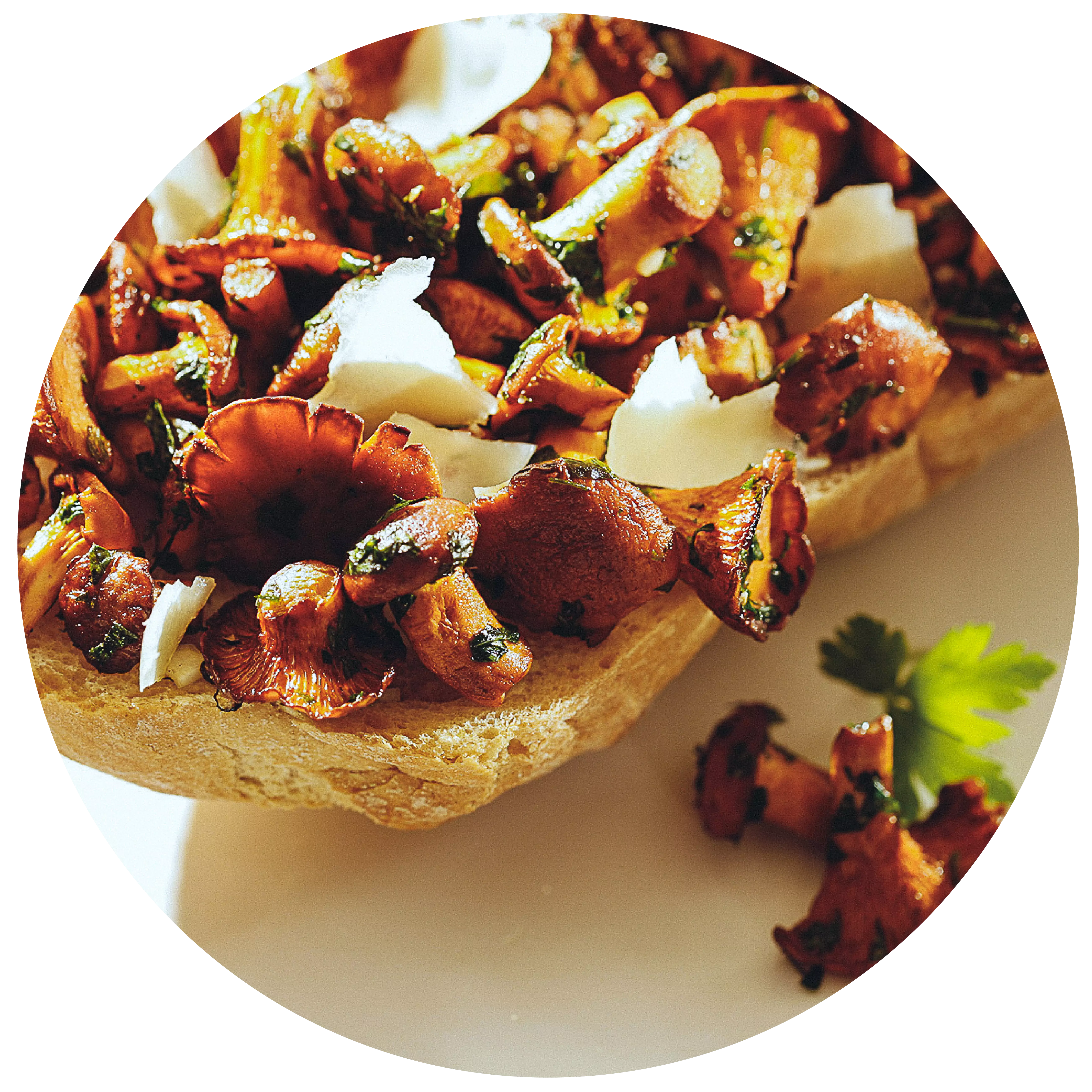
Teaser
Events
-
Show
winetasting in our winery - cheese & wine
Mainz-Hechtsheim


